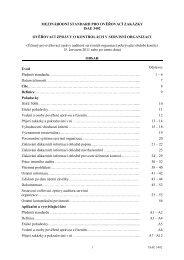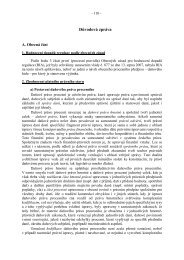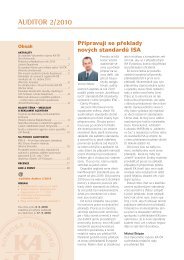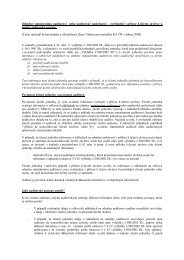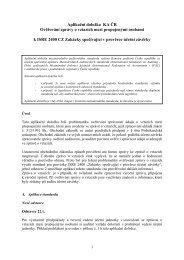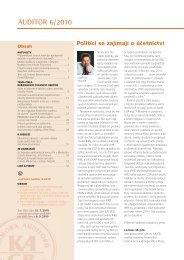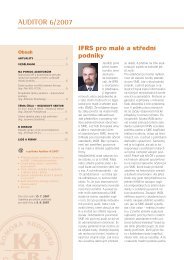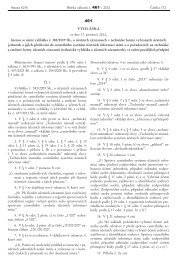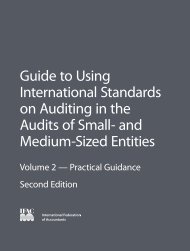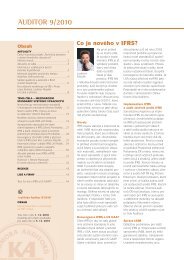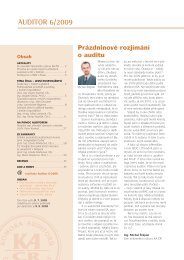Guide to Using International Standards on Auditing in - IFAC
Guide to Using International Standards on Auditing in - IFAC
Guide to Using International Standards on Auditing in - IFAC
You also want an ePaper? Increase the reach of your titles
YUMPU automatically turns print PDFs into web optimized ePapers that Google loves.
219<br />
<str<strong>on</strong>g>Guide</str<strong>on</strong>g> <str<strong>on</strong>g>to</str<strong>on</strong>g> <str<strong>on</strong>g>Us<strong>in</strong>g</str<strong>on</strong>g> <str<strong>on</strong>g>Internati<strong>on</strong>al</str<strong>on</strong>g> <str<strong>on</strong>g>Standards</str<strong>on</strong>g> <strong>on</strong> <strong>Audit<strong>in</strong>g</strong> <strong>in</strong> the Audits of Small- and Medium-Sized Entities Volume 1—Core C<strong>on</strong>cepts<br />
Paragraph #<br />
ISA Objective(s)<br />
700.6 The objectives of the audi<str<strong>on</strong>g>to</str<strong>on</strong>g>r are:<br />
(a) To form an op<strong>in</strong>i<strong>on</strong> <strong>on</strong> the f<strong>in</strong>ancial statements based <strong>on</strong> an evaluati<strong>on</strong> of the c<strong>on</strong>clusi<strong>on</strong>s<br />
drawn from the audit evidence obta<strong>in</strong>ed; and<br />
(b) To express clearly that op<strong>in</strong>i<strong>on</strong> through a written report that also describes the basis for<br />
that op<strong>in</strong>i<strong>on</strong>.<br />
Paragraph #<br />
Relevant Extracts from ISAs<br />
700.7 For purposes of the ISAs, the follow<strong>in</strong>g terms have the mean<strong>in</strong>gs attributed below:<br />
(a) General purpose f<strong>in</strong>ancial statements—F<strong>in</strong>ancial statements prepared <strong>in</strong> accordance with<br />
a general purpose framework.<br />
(b) General purpose framework—A f<strong>in</strong>ancial report<strong>in</strong>g framework designed <str<strong>on</strong>g>to</str<strong>on</strong>g> meet the<br />
comm<strong>on</strong> f<strong>in</strong>ancial <strong>in</strong>formati<strong>on</strong> needs of a wide range of users. The f<strong>in</strong>ancial report<strong>in</strong>g<br />
framework may be a fair presentati<strong>on</strong> framework or a compliance framework.<br />
The term “fair presentati<strong>on</strong> framework” is used <str<strong>on</strong>g>to</str<strong>on</strong>g> refer <str<strong>on</strong>g>to</str<strong>on</strong>g> a f<strong>in</strong>ancial report<strong>in</strong>g framework<br />
that requires compliance with the requirements of the framework and:<br />
(i) Acknowledges explicitly or implicitly that, <str<strong>on</strong>g>to</str<strong>on</strong>g> achieve fair presentati<strong>on</strong> of the f<strong>in</strong>ancial<br />
statements, it may be necessary for management <str<strong>on</strong>g>to</str<strong>on</strong>g> provide disclosures bey<strong>on</strong>d those<br />
specifically required by the framework; or<br />
(ii) Acknowledges explicitly that it may be necessary for management <str<strong>on</strong>g>to</str<strong>on</strong>g> depart from a<br />
requirement of the framework <str<strong>on</strong>g>to</str<strong>on</strong>g> achieve fair presentati<strong>on</strong> of the f<strong>in</strong>ancial statements.<br />
Such departures are expected <str<strong>on</strong>g>to</str<strong>on</strong>g> be necessary <strong>on</strong>ly <strong>in</strong> extremely rare circumstances.<br />
The term “compliance framework” is used <str<strong>on</strong>g>to</str<strong>on</strong>g> refer <str<strong>on</strong>g>to</str<strong>on</strong>g> a f<strong>in</strong>ancial report<strong>in</strong>g framework that<br />
requires compliance with the requirements of the framework, but does not c<strong>on</strong>ta<strong>in</strong> the<br />
acknowledgements <strong>in</strong> (i) or (ii) above.<br />
(c) Unmodified op<strong>in</strong>i<strong>on</strong>—The op<strong>in</strong>i<strong>on</strong> expressed by the audi<str<strong>on</strong>g>to</str<strong>on</strong>g>r when the audi<str<strong>on</strong>g>to</str<strong>on</strong>g>r c<strong>on</strong>cludes<br />
that the f<strong>in</strong>ancial statements are prepared, <strong>in</strong> all material respects, <strong>in</strong> accordance with the<br />
applicable f<strong>in</strong>ancial report<strong>in</strong>g framework.<br />
700.8 Reference <str<strong>on</strong>g>to</str<strong>on</strong>g> “f<strong>in</strong>ancial statements” <strong>in</strong> this ISA means “a complete set of general purpose<br />
f<strong>in</strong>ancial statements, <strong>in</strong>clud<strong>in</strong>g the related notes.” The related notes ord<strong>in</strong>arily comprise<br />
a summary of significant account<strong>in</strong>g policies and other explana<str<strong>on</strong>g>to</str<strong>on</strong>g>ry <strong>in</strong>formati<strong>on</strong>. The<br />
requirements of the applicable f<strong>in</strong>ancial report<strong>in</strong>g framework determ<strong>in</strong>e the form and c<strong>on</strong>tent<br />
of the f<strong>in</strong>ancial statements, and what c<strong>on</strong>stitutes a complete set of f<strong>in</strong>ancial statements.<br />
700.9 Reference <str<strong>on</strong>g>to</str<strong>on</strong>g> “<str<strong>on</strong>g>Internati<strong>on</strong>al</str<strong>on</strong>g> F<strong>in</strong>ancial Report<strong>in</strong>g <str<strong>on</strong>g>Standards</str<strong>on</strong>g>” <strong>in</strong> this ISA means the <str<strong>on</strong>g>Internati<strong>on</strong>al</str<strong>on</strong>g><br />
F<strong>in</strong>ancial Report<strong>in</strong>g <str<strong>on</strong>g>Standards</str<strong>on</strong>g> issued by the <str<strong>on</strong>g>Internati<strong>on</strong>al</str<strong>on</strong>g> Account<strong>in</strong>g <str<strong>on</strong>g>Standards</str<strong>on</strong>g> Board, and<br />
reference <str<strong>on</strong>g>to</str<strong>on</strong>g> “<str<strong>on</strong>g>Internati<strong>on</strong>al</str<strong>on</strong>g> Public Sec<str<strong>on</strong>g>to</str<strong>on</strong>g>r Account<strong>in</strong>g <str<strong>on</strong>g>Standards</str<strong>on</strong>g>” means the <str<strong>on</strong>g>Internati<strong>on</strong>al</str<strong>on</strong>g> Public<br />
Sec<str<strong>on</strong>g>to</str<strong>on</strong>g>r Account<strong>in</strong>g <str<strong>on</strong>g>Standards</str<strong>on</strong>g> issued by the <str<strong>on</strong>g>Internati<strong>on</strong>al</str<strong>on</strong>g> Public Sec<str<strong>on</strong>g>to</str<strong>on</strong>g>r Account<strong>in</strong>g <str<strong>on</strong>g>Standards</str<strong>on</strong>g> Board.




